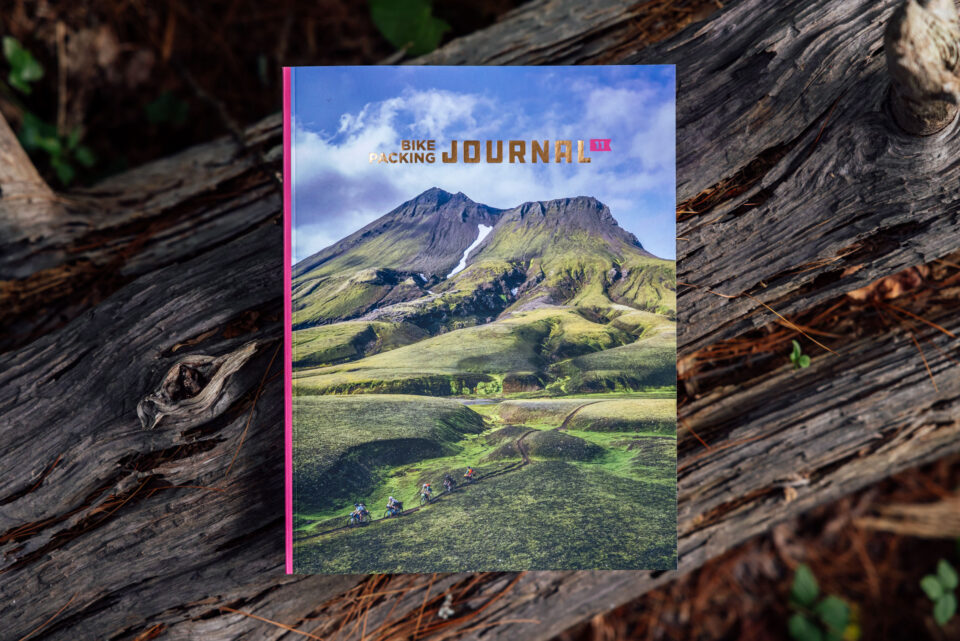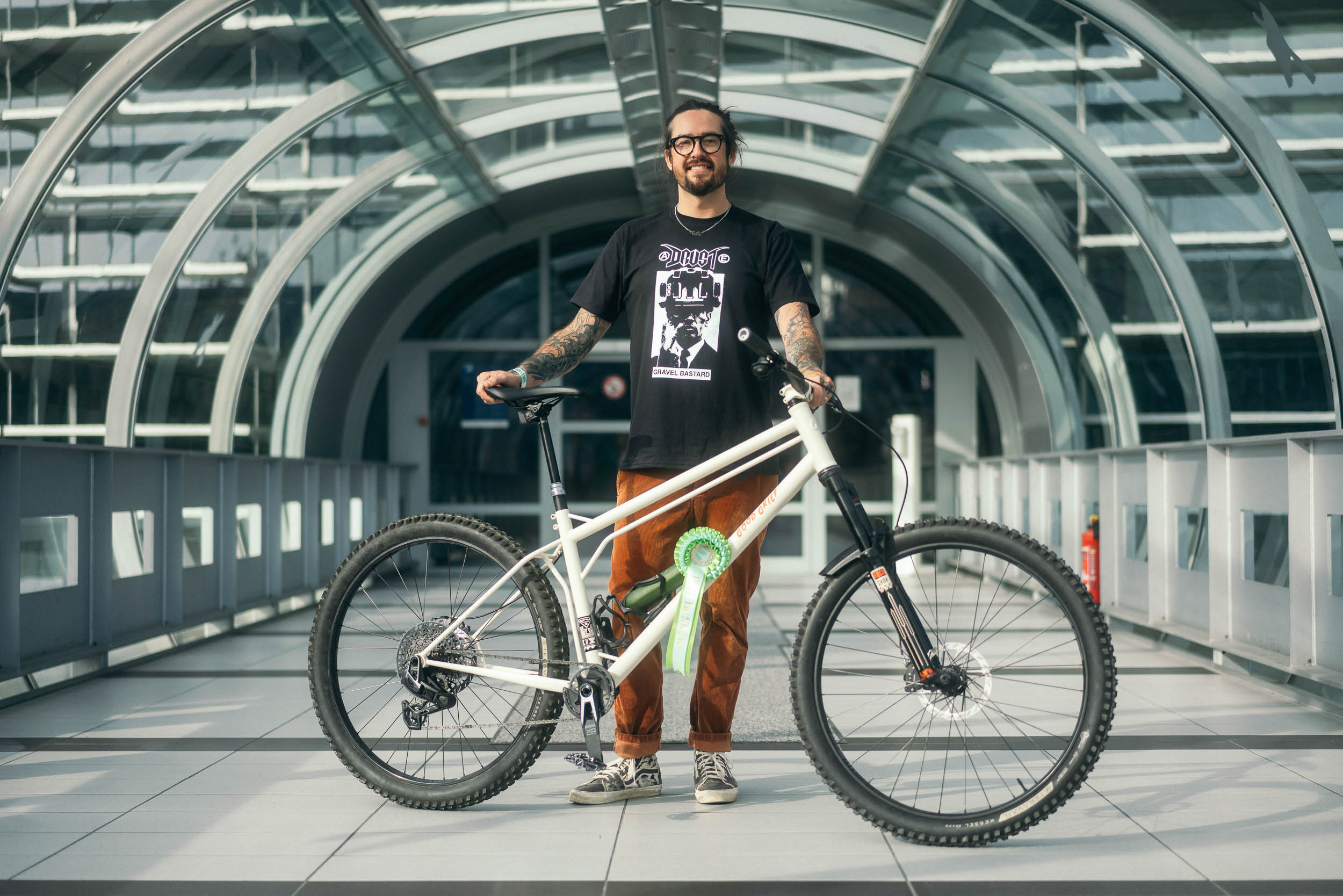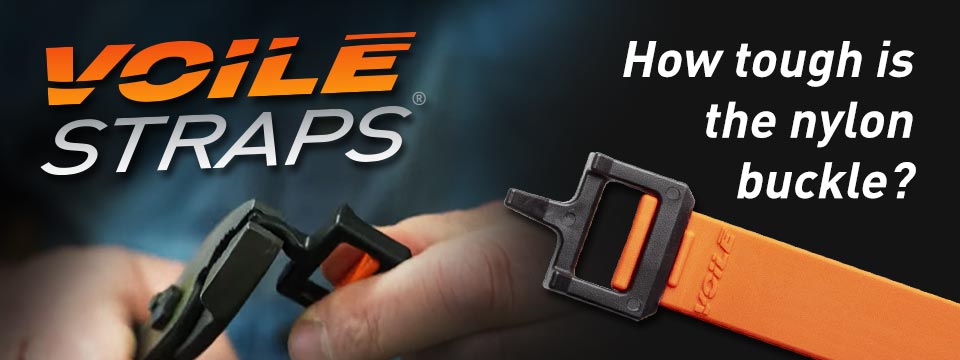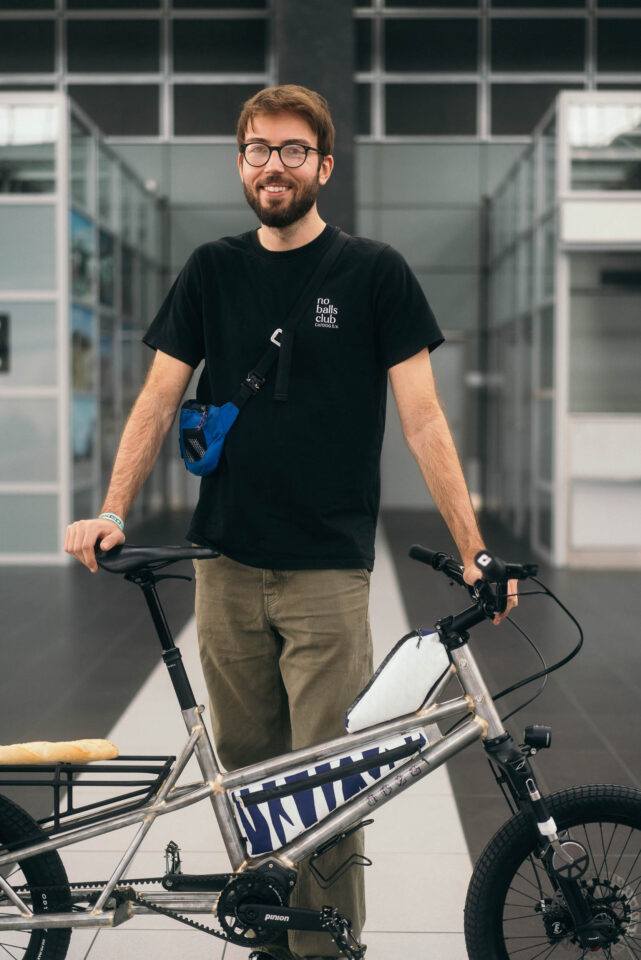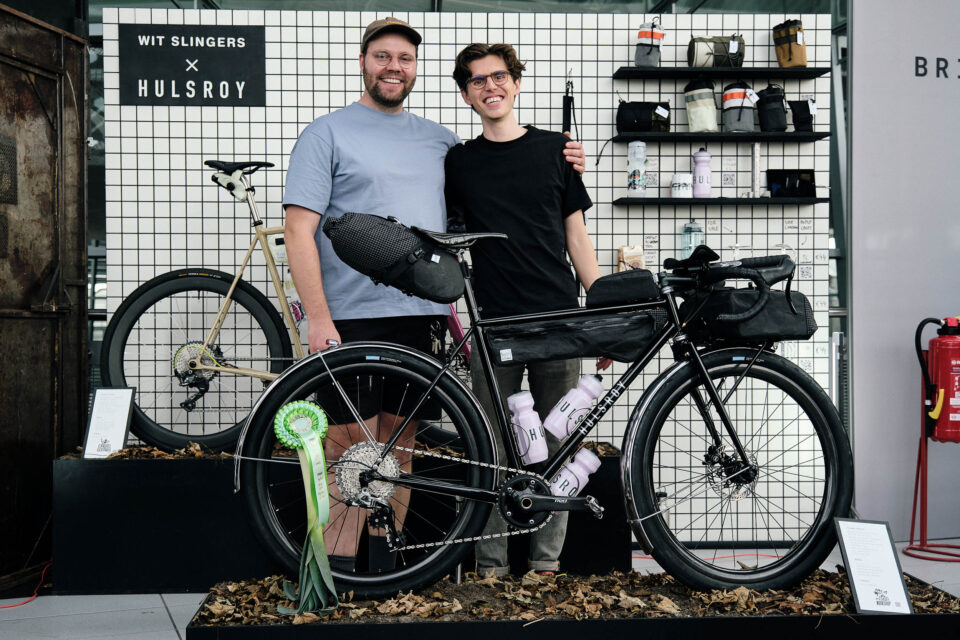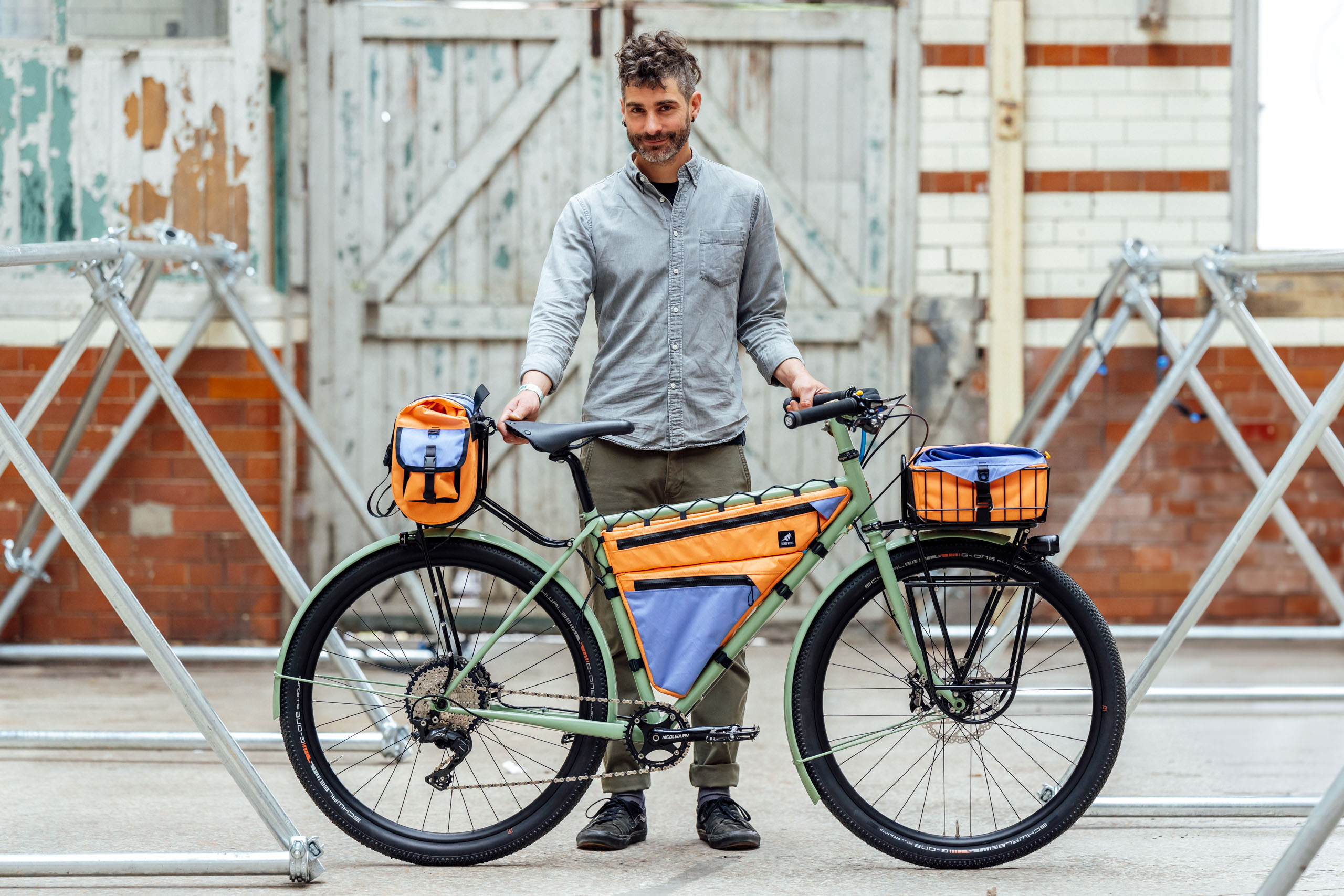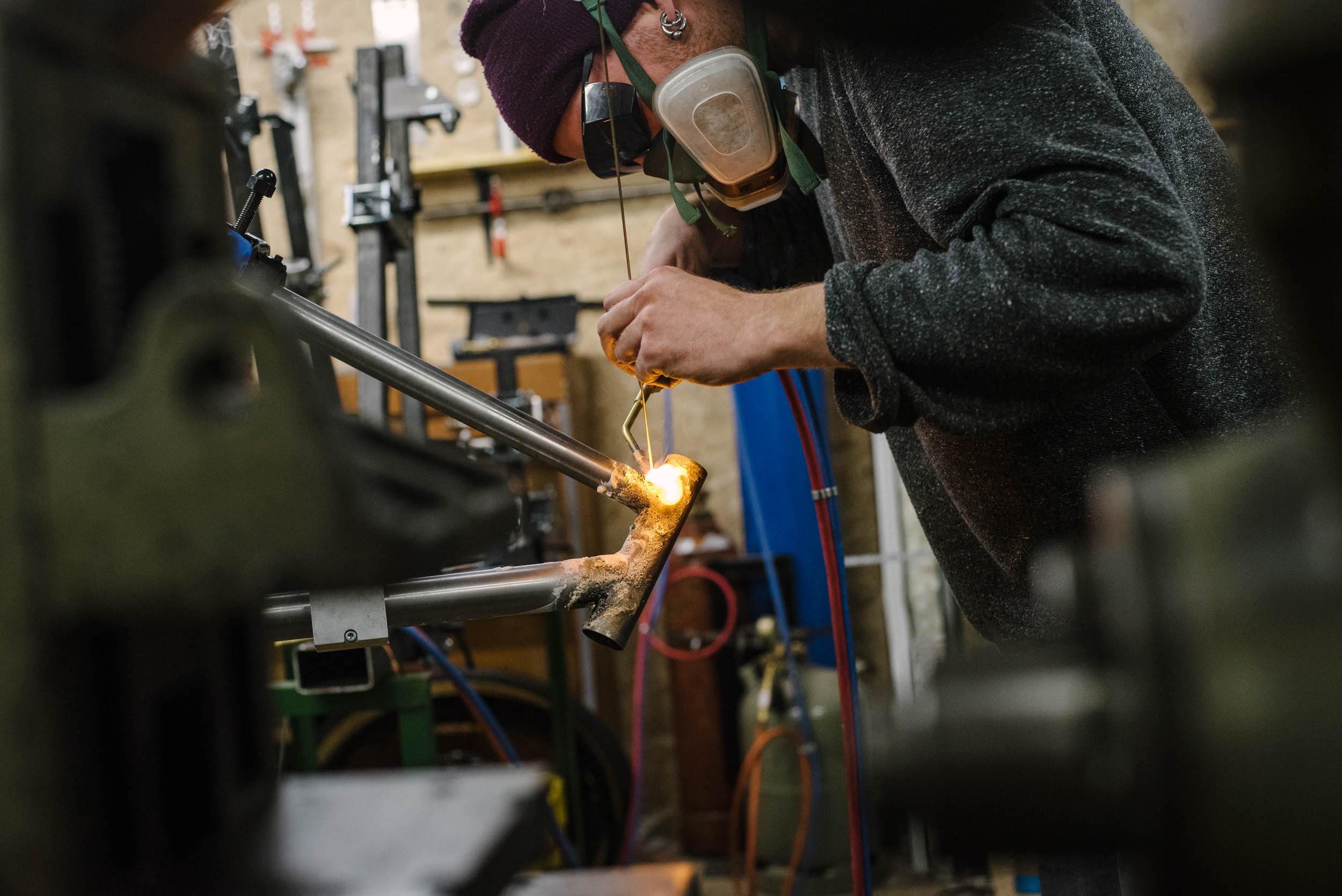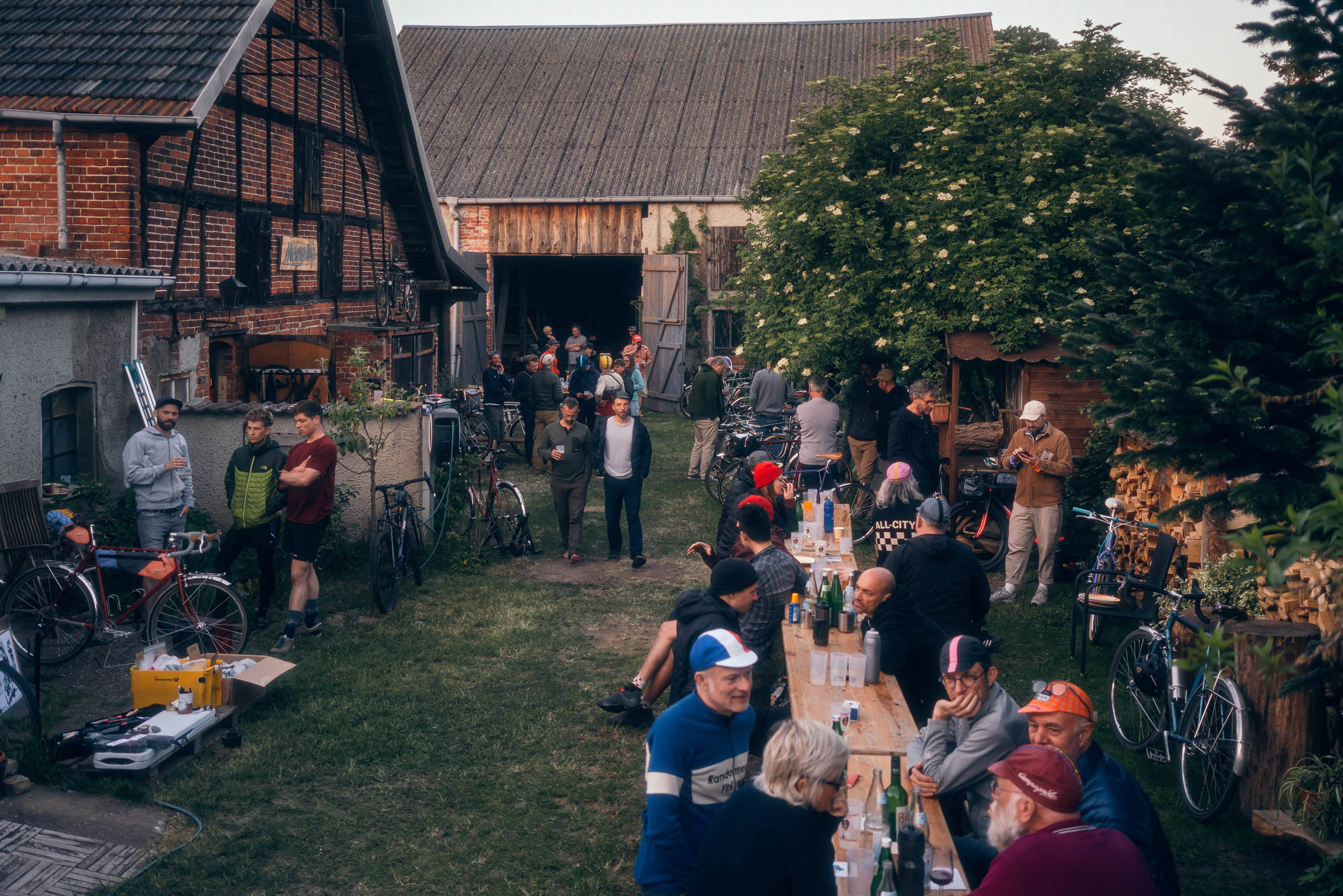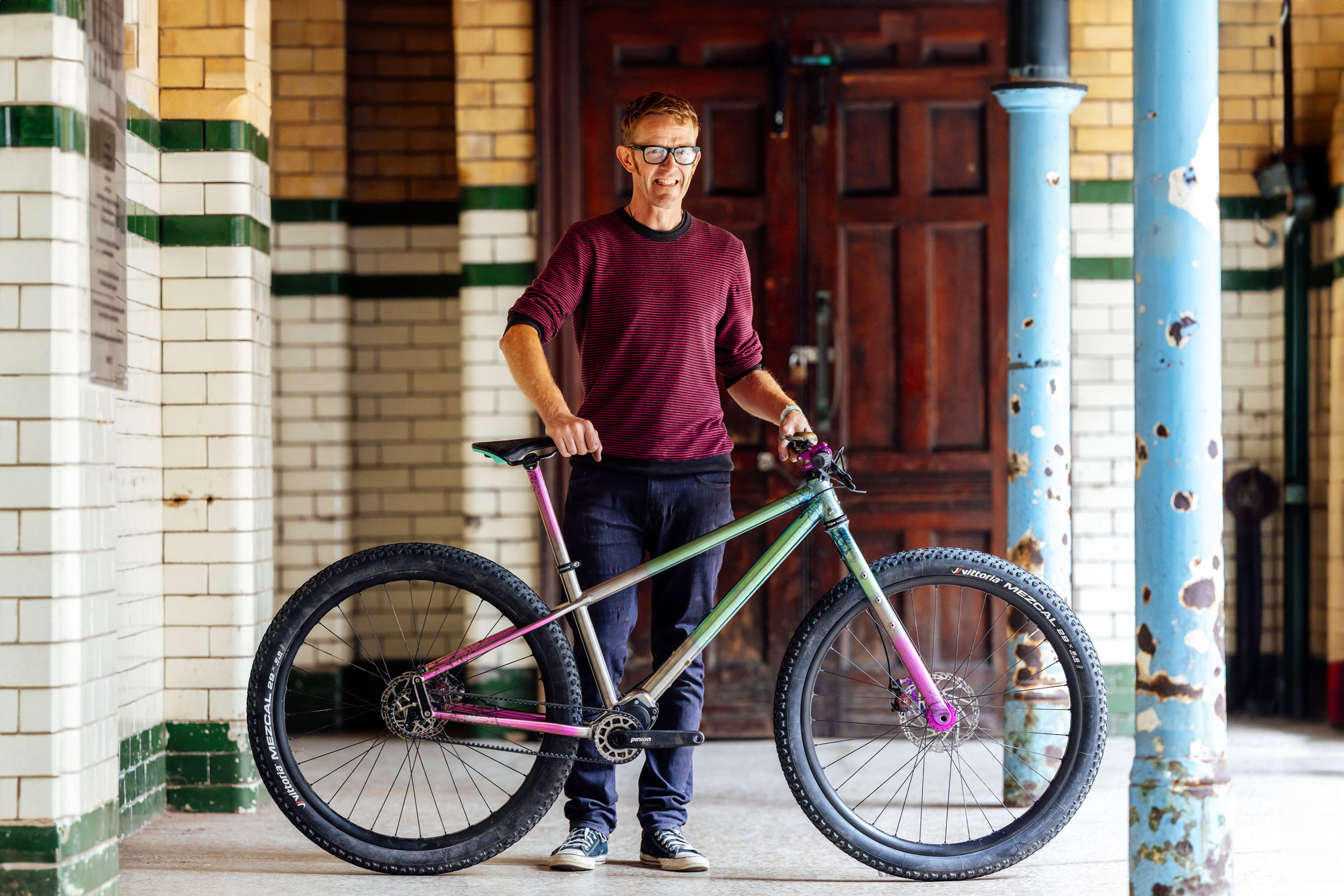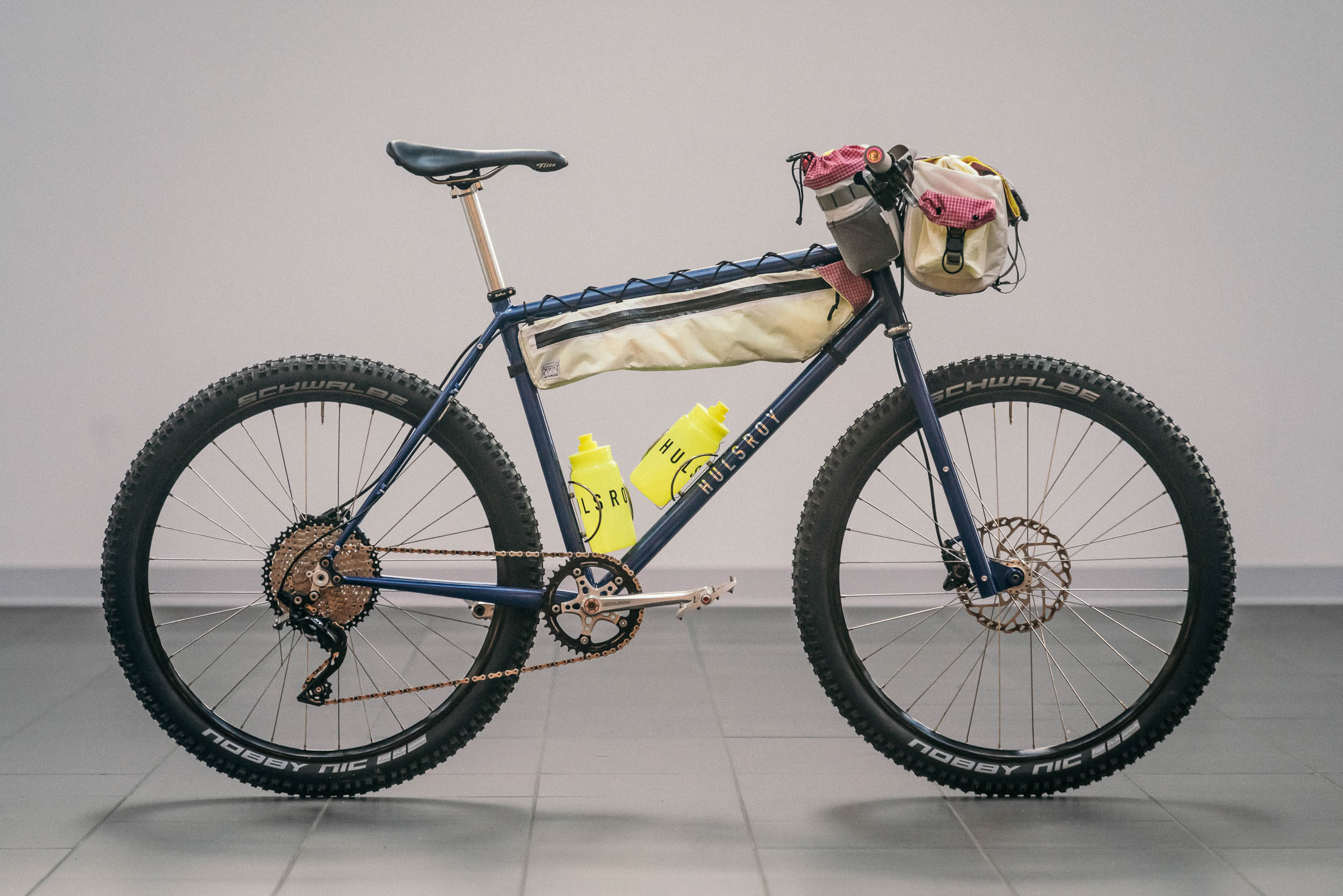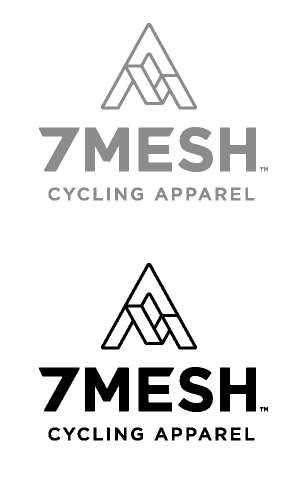Bikes and Builders of Bespoked Dresden 2024 (Part 1)
The mainland Europe edition of Bespoked 2024 is well underway at the Dresden International Airport in Germany, and we’ve been pacing the halls all weekend to uncover the show’s most exciting new custom bikes, bags, and other bits. In our first installment, we highlight a sweeping mix of purpose-built machines and more from some of the most talented builders across the continent and beyond. Dig in here…
PUBLISHED Oct 20, 2024
Bike and builder portraits by Stefan Haehnel, others by Josh Meissner
A little over two years after leaving Berlin for Colorado, I’m delighted to finally be back in Germany, and my first return visit as a tourist coincides with the second edition of Bespoked in Dresden. For readers who haven’t caught our coverage dating back to 2019, Bespoked is Europe’s largest handmade bike show, which has been running for 13 years and counting. In addition to the longstanding event in the United Kingdom, Bespoked once again took over the laid-back Dresden International Airport for this year’s mainland gathering. It’s a slightly incongruous and whimsical place to host a bike expo, but it somehow works.
Among the waves of perplexed onlookers waiting to catch flights destined for various corners of the continent, I’ve bumped into countless old friends, contributors, builders, bag makers, organizers, designers, media folks, and others. Bespoked is a beautiful convergence of the most creative bicycle people from around Europe and elsewhere, and it’s been a blast catching up and getting to know attendees and exhibitors alike. More than 130 brands—mostly small and independent—are eagerly showing off their creations, and a couple of my regular Berlin-based collaborators are also here helping me seek out a handpicked selection of favorite finds from the jam-packed terminal. Find the first roundup of fresh bikes, bags, parts, and more that Josh Meissner, Stefan Haehnel, and I caught during the ongoing show’s whirlwind first couple of days below.
Meerglas Explorer link
Gross Lueben, Germany
We were tasked with picking the “Best Gravel Bike” of Bespoked Dresden 2024, and although there are many exceptional examples of modern gravel bikes on display with carbon forks, frame mounts galore, and flashy matching bags and paint, the one that caught the whole team’s eyes on the first day of the show was the tentatively titled Meerglass Explorer by Thomas Becker, a beloved German builder who got his framebuilding start in Berlin but now lives and makes bikes in his sleepy home village in the neighboring state of Brandenburg.

Humble, open, and soft-spoken, Thomas told me how he found framebuilding during a period of life when he was feeling adrift. His path forward revealed itself by chance during a trip to Denmark one New Year’s Eve. He found a piece of sea glass (Meerglas in German) along the beach, and something clicked. “In one second, everything was there,” he told me. The future of Meerglas bicycles washed right up to his feet. Not long after, he began an apprenticeship as a bicycle mechanic, then pedaled off on a yearlong tour from Berlin to Saigon around 2011 before diving fully into the world of building custom frames a dozen years ago.
Subtle but striking, the lugged Meerglass Explorer is unlike anything else on display in Dresden. It takes Thomas’s typical 1950s and ’60s French randonneur inspiration and adds an off-road-ready twist. It’s an experimental build made to be as flexy as possible—something common in the world of randonneur bikes but yet to be tested by Thomas as it applies to all-terrain riding. In fact, he threw a leg over it for the very first time during our photo shoot, beaming with an infectious smile. And if it doesn’t end up working out, Thomas says he’ll still be happy to have it hanging on the wall and looking cool, knowing he satisfied his curiosity.

At the heart of the build is a thin and heavy Campagnolo Grand Sport crankset from around the 1960s paired with a custom one-off chainring Thomas commissioned from Rovar Cycles in the Netherlands, inspired by designs from the 1930s. Adding to the Explorer’s nearly endless charm are two retired SON headlights found lying around the Schmidt Maschinenbau workshop powered by a Velogical rim dynamo.
Thomas also mated a pair of polished Campagnolo Veloce 10-speed road shifters to a shiny old Shimano XTR 9-speed mountain rear derailleur using a Jtek Shiftmate adapter and topped off the build with Rene Herse cantilever brakes and a full set of understated Gramm Tourpacking frame bags. It includes a top tube bag, a bolt-on partial frame, and a Diamond Bag atop a self-made front rack with detachable low-riders. The only missing piece of the jaw-dropping puzzle is a set of Gramm mini panniers to round out the build’s harmonious lines. We’re excited to hear the feedback from Thomas’s first rides after the show.
Good Grief Cheeku Hardtaillink
Colorado Springs, Colorado, USA
One of this year’s small handful of BESPOKED x SRAM Inclusivity Scholarship winners, Chris Schmidt of Good Grief in Colorado Springs, Colorado, has been causing quite a buzz at the event with his distinctive hardtail. His sixth bike under the Good Grief moniker, Cheeku, is a nod to his Native American heritage and family name. “I’m using this bike to bring eyes on Indigenous Americans in cycling,” he told me, citing only a single other Native American builder he’s aware of in the industry.

Longtime readers might remember Chris from the remarkable 2020 story he wrote for the site about riding the Colorado Trail on a fixed gear, Liquid Sunshine. As it happens, his new brand takes its name indirectly from that piece. Last year, when Chris was at a bike swap trying to sell the fixed gear Velocity Dually rims he used on that trip, an older gentleman’s response to hearing their backstory was simply, “Good grief!” He had his framebuilding name.
Although he’s only been in the full-time building business for less than a year, Chris has a 15-plus-year history in the cycling industry and has made frames for friends since 2011, when he took master framebuilder Koichi Yamaguchi’s course. Chris formally launched Good Grief in January, and he hit the ground running by taking home the coveted award for “Best in Show” in Dresden. It’s a well-deserved recognition for the cheerful emerging builder.
Chris built the Good Grief Cheeku hardtail as his personal bike to tackle the steep and loose trails around his home at the foot of 14,115-foot (4,302-meter) Pikes Peak in Colorado, where he says the massive 475mm chainstays are specced to help him feel extra planted on the backcountry enduro rides he enjoys most. Despite the long stays, he says the frame’s back end is still super lively, especially without a yoke. In addition to ever-longer chainstays, another thing he’s enjoying experimenting with is increasing the head tube length instead of using riser bars to achieve his desired position on the bike. With 510mm reach and 690mm stack, it’s a big bike, but it maintains a graceful stance.

Ask anyone who’s laid eyes on the bike, and they’ll tell you that the defining touch of the Cheeku is the unusual secondary set of tubes that reinforce the frame. To arrive at their design, Chris conducted a finite element analysis (FEA) of the frame to identify weaker spots on a heat map, then reinforced them, using analytics to make a bike with a singular style. Ask Chris about the standout feature, though, and he’ll tell you it’s the hand-painted Zuni pattern and cattails on the 150mm Lyrik fork—another homage to his Paiute-Shoshone/Zuni background painted by his talented wife Lauren, a designer who also did all of Good Grief’s branding.
Chris said he’s had a blast cruising around Dresden in the little time he’s had away from the show, but he’s excited to return home after the weekend. He has orders to fill, after all!
M83 Adjustable Front Rack Prototype link
Sarstedt, Germany
I was drawn to the prototype adjustable front rack from the German gravel bike brand M83 shortly after I arrived at the show on Friday. I’ve yet to fully think through its true versatility and how I’d use it, but the concept is certainly compelling. Co-founder and product designer Benjamin Bartoli from M83 walked me through the design of the forthcoming multi-modular rack, which he’s hoping they’ll have finalized by next spring. It takes the place of a small headtube spacer up top and mounts to the fork crown at the bottom without needing struts connected to the fork blades.

The rack is designed to fit M83’s complete size range of bikes, offering around 2.5 centimeters (an inch) of vertical adjustment. In addition to supporting a handlebar bag, it can help protect the bike’s head tube from bag rub. For now, it’s rated to carry a modest six kilograms (13 pounds). According to Benjamin, they’re also developing a bag that will elegantly attach to the platform using Fidlock mounts as well as rear-facing bottle mounts that attach to the vertical struts (no need for the rack) and lower mounts for running lights and other accessories up front.

M83’s front rack system is mostly aluminum, except for the two steel struts. In the future, Benjamin says they’ll likely offer at least one more color option beyond the current powder-coated black. Pricing has yet to be determined, but he hinted that the whole kit will hopefully be under €200 ($215).
Alonukis Frameworks Cruiser link
Murnau am Staffelsee, Germany
As someone who loves practical and retro-inspired bikes in equal measure, Alonukis Frameworks’s cruisey commuter, which manages to blend elements of both, is one of my favorite bikes from the event. This was 23-year-old builder Johannes Wandinger’s first time showing a bike anywhere, but it wasn’t the first time we’ve offered a glimpse of his work. His recent Reader’s Rig served as a little teaser in the lead-up to this weekend’s show, and I’ve been looking forward to seeing more of what he can do. His three bikes on display blew me away.

Coming from a background as a master carpenter and woodworker, where he built kitchens, art installations, and other various projects, Johannes eventually made the switch to fabricating with steel through fabricating and selling framebuilding tools, and he’s been making bikes full-time since last May. He told me he’ll always love working with wood, but he found something undeniably alluring about metal and hasn’t looked back since. “You can mess up both materials really easily, but the consequences are much bigger with bikes,” he laughed when I asked him about the parallels between the two materials. One key thing that has translated from wood to steel is his learned ability to visualize designs and final products before any timber or tubes are cut.
Designed for chill mountain bike rides and bringing a little joy into any spin around town, Johannes’s freshly built cruiser is a collaborative project made in partnership with friends Dominik of B-Schicht Stelle, who did the paint, and Christoph of Just La Vie Cyclery, who specced the parts and built up the bike. “Feeling good on the bike and having fun are what matter most,” he told me, and this cruiser embodies that spirit. Johannes said his favorite details are the sleeved seatpost clamp and the stunning fork crown he milled himself—a tribute to Canadian framebuilding legend Paul Brodie, who he says has been a huge influence and source of information (his workshop videos on YouTube are great!).

As with every bike Johannes has made, this Alonukis (an anagram of his middle name, Nikolaus) is a one-off, but he has hopes of launching batch production sooner rather than later, though he’s not sure what form his first production model will take. It probably won’t have rim brakes and a double crankset, but the retrogrouches among us can hope!
Avalanche Cycles Stainless ATB link
Paris, France
Avalanche Cycles from Paris, France, won multiple awards this year, including “Best Off-Road” for this flabbergasting stainless steel ATB. Builders Laurent and Marie made it for a customer in nearby Normandy, and he’s already put some 6,000 kilometers (3,725 miles) on it during the brief six months he’s had it in his possession, pedaling all around France and commuting across town.

The more you look at the highly capable go-anywhere monster, the more the exceptional details reveal themselves, including the custom 3D-printed seatstay cluster, fork crown, and chainstay yoke. The stainless racks, massive fenders covering burly 27.5 x 2.8″ tires, shoulder strap for sustained hike-a-bikes, internal cable routing, tasteful custom front and rear panniers from Cours s’il Pleut, and simple logo that nearly jumps off the frame are merely the icing on the already decadent cake.

Partners Laurent and Marie of Avalanche work in tandem, with one taking the lead on each project for consistency’s sake, focusing on one bike at a time. In this instance, Laurent made the frame, and Marie built the brilliant matching racks. They’ve been creating bikes under the Avalanche Cycles name since 2021, winning other awards and garnering attention along the way. Before that, the duo spent three years learning, practicing, and building bikes for themselves to test the proof of concept. Judging by the four examples on display in Dresden, it’s clear they’ll be an operation to watch in the European framebuilding scene in the years to come.
Timba Bags link
Dresden, Germany
Breaking up the sea of black bikepacking bags, Thea Elsner of Timba from Dresden brought a couple of bright, upbeat designs to her hometown show. A fun lemon design adorns the white wedge frame bag that laces up to her new road bike. At her stand, visitors also have the unique opportunity to compare dozens of samples of technical fabrics, cordage, and edge binding. Don’t miss the best opportunity to imagine what a custom Timba bag in your dream color could look like!
The colorful Upside Down Bag on the Stijn Cycles mini road bike attracted many curious attendees, including me. Playing with the unusual proportions of the mini frame, the triangular bag can be mounted either above or below the top tube. Accordingly, it features zippers on both sides to allow it to work in both orientations. I’m not sure how useful this is in practice, but experimentation is what these shows are about, and it’s a clever concept I haven’t seen anywhere else.

Abes Mini Longtail link
Berlin, Germany
Paul Piegsa’s Abes Mini Longtail prototype came together at the last minute, and we were lucky to document it in its raw glory. Three years on and off in the making, Paul envisioned a utilitarian longtail but sportier and more off-road-worthy than your typical cargo bike. It seems like a fun everyday ride for everything from commuting to loading up with luxuries for a glampacking overnighter or gravel road tour. Paul was visibly exhausted when I spoke with him but glowing with pride nonetheless.

Before he started on the frame, Paul took a framebuilding course at Big Forest Frameworks to learn the basics of the craft. A trained designer, he sketched dozens of variants. The work seems to have paid off, as the Mini Longtail is one of the most aesthetically pleasing cargo bikes at the show. I like its balanced proportions, strong lines, and playful symmetries throughout—it looks great.
The heavy-duty rear rack is roughly twice the length of a standard baguette and could support a small human. Headtube mounts open up possibilities for loading up the front, too. Paul designed custom sliding dropouts to fit the Pinion C1.12 gearbox, disc brakes, sensors, and rack mounts within the tight frame. A clever idler wheel reroutes the belt above the chainstay, eliminating the need for multiple couplers in the frame. The 20-inch front wheel is suspended by a Bike Technology suspension fork.
While the project was primarily a challenge to learn the skills and refine the concept, Paul is considering having a small batch made if there’s enough interest. He was quick to note that he relied on the generous support of his workshop mate Toni, colleagues at Schindelhauer and Riese & Müller, his friend Basti, Florian at Fern, Frauke Bucholz for the essential bags, and many more. “I would have never succeeded at this alone,” he said.
Putting Faces to Names
As overwhelming and exhausting as they can be, attending events like Bespoked offers an unparalleled opportunity to make in-person connections with like-minded folks from our niche community. Through my work, I’ve been exchanging messages, emails, calls, and ideas with bike people all over the globe for a dozen years now, and finally having the occasion to meet and spend real time together is the thing that makes the time and effort required to get to a place like Dresden International Airport more than worthwhile. To be here in the thick of it is surreal at times, even. Hey, it’s Gaëlle, one of my cycling heroes!
In addition to meeting some of my favorite makers for the first time, this German show was also special because I could give hugs and high-fives to dozens of old friends and colleagues from Berlin. Two years of interacting with friends as merely profile photos on WhatsApp or talking heads on Zoom is a long time, and the experience of coming back has reinvigorated my love for the unique community of unthinkably creative, kind, and interesting people who call this region home.
Thanks for reading! Stay tuned for more from Bespoked Dresden 2024 in the days ahead. If there’s anything you particularly enjoyed or want to see more of from our remaining time at the show, give us a shout in the conversation below.
Further Reading
Make sure to dig into these related articles for more info...
Please keep the conversation civil, constructive, and inclusive, or your comment will be removed.


